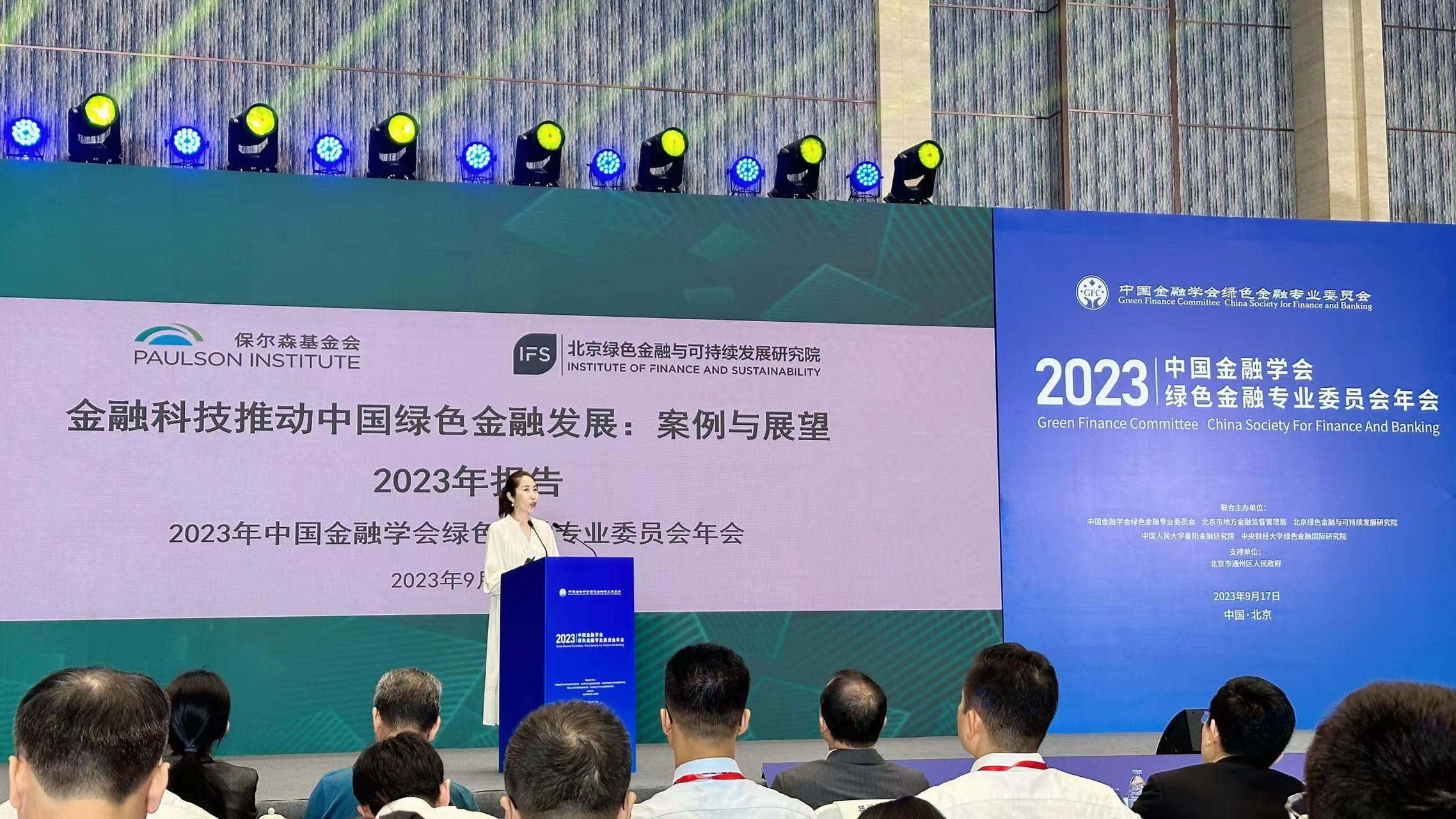PI’s Gracie Sun Presents at the Green Finance Annual Meeting
On September 17, 2023, the Green Finance Committee (GFC) held its eighth annual meeting in Beijing, during which 20 achievements were unveiled—aiming to propel green finance’s sustainable innovation and development. Leaders from the People’s Bank of China (PBOC), major financial institutions, and experts from nearly 70 institutions took a deep dive into transition finance, green finance product innovation, regional green and low-carbon development of high-quality sustainability information disclosure, and other topics. Gracie Sun, Senior Advisor and Managing Director of the Green Finance Center at the Paulson Institute presented Fintech Facilitates Green Finance Development in China: Cases and Outlooks (The 2023 Report).
Gracie Sun emphasized that fintech plays a crucial role in underpinning the development of green and transition finance. With inherent technological advantages, fintech enhances data authenticity, reliability, and traceability and meets the growing sustainability-related information disclosure requirements of green finance and the “dynamic” disclosure requirements of transition finance.
Since 2020, the Green Finance Center at the Paulson Institute and the Institute of Finance and Sustainability have studied fintech’s application and real cases in advancing China’s green finance ambition. The report, the fourth installment of the series, reviews the history of fintech-enabled green finance development in China since 2020.
The report highlights that financial regulators have issued concrete guidelines to empower green finance with fintech to boost quality and efficiency. The number of tech companies active in China’s green finance sector has increased, almost doubling in the past three years. The market previously dominated by small and midsize companies now sees tech giants making big moves in expanding their green finance business by offering specialized solutions.
By tracking the latest progress of the three typical cases in the past reports and introducing several new cases on how fintech facilitates green finance, the report focuses on critical areas such as transition finance, inclusive finance, corporate carbon asset management, and ESG investment. It concludes by addressing the challenges to adopting fintech to support green finance development in China. The report puts forward targeted recommendations to drive high-quality green finance development in China with fintech: to accelerate the setup of climate and environmental data sharing mechanisms, to build green project databases and matchmaking platforms, to improve the incentive system for green tech innovation, to foster collaboration between financial institutions and tech companies, and continue to expand and innovate core areas such as transition finance and green inclusion.
Xin Wang, Director General of the Research Bureau of PBOC, outlined in his opening remarks that the bank, in collaboration with relevant departments, would strive to build a green finance system and channel financial resources to green and low-carbon sectors. They have made great strides in standard-setting, information disclosure, policy incentives, product development, and market expansion. Mr. Wang also zoomed in on the next steps for green finance:
- Draw upon the G20 Transition Finance Framework to accelerate the development of China’s transition finance.
- Improve financial institutions’ carbon accounting and environmental information disclosure capabilities and speed up the shift from voluntary disclosure to mandatory disclosure.
- Upgrade green finance products and services.
- Further promote the construction of green finance reform and innovation pilot zones.
- Bolster international partnerships and investment in capacity building in other developing countries.
Dr. Jun Ma, Chairman of GFC, presented The GFC Work Report (2022-2023) and Outlook (2023-2024) at the annual meeting. He reviewed the Committee’s many wins in the past year in transition finance, environmental information disclosure, product innovation, research on international experience, and financial support for biodiversity and global partnership. Looking ahead, the Committee plans to focus on the following eight areas next year:
- In-depth study of transition finance standards and promotion of innovation in related tools;
- Support for listed companies, financial institutions, and businesses in transition to deepen sustainability information disclosure;
- Ongoing study of Financial Support for Biodiversity;
- Extensive research on green inclusion and green consumption;
- Greater publicity and dissemination of green finance accomplishments and the concept of green development;
- Potential research on sustainable finance for gender equality;
- Further adoption of Common Ground Taxonomy in a variety of use cases;
- International partnership in green finance and capacity building for developing countries.
The Paulson Institute remains committed to building green finance systems and driving green finance markets around the globe to thrive with market-based solutions.



